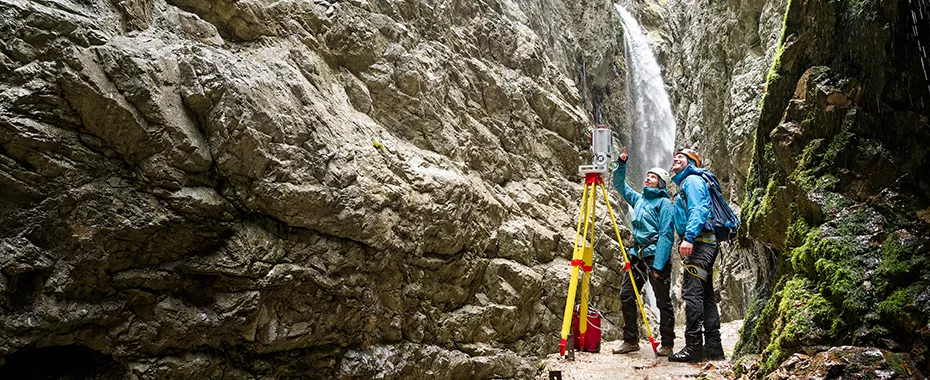Geosciences B. Sc.
The Bachelor of Geosciences program is a joint program of TUM and Ludwig-Maximilians-Universität München at the Munich GeoCenter (MGC). This means that you can benefit from the expertise and infrastructure of two of the best universities in Germany. As a result, you will have access to a wide range of high-quality lectures, tutorials and field events.
Are you interested in the processes in and on the earth, its evolution and the origin of life on it? Would you like to know what forces lie dormant inside the Earth, how mountains are formed, or how the fauna and flora on Earth have changed over millions of years? Are you fascinated by natural forces such as earthquakes, volcanoes or landslides and want to know how they are created and how we can counter them? Are you interested in minerals, crystals and how new materials are developed? Would you like to learn where humans get their raw materials and clean water from, or how they explore the subsoil for buildings to make sure they will last for many years to come? In all these cases, it is best if you decide to study geosciences at the Munich GeoCenter!
What you'll learn for your future?
Geoscientists deal with the earth in a scientific sense, i.e. with the structure, the development as well as the processes of the system earth. They study the earth's body and surface, the effects of human intervention on the environment and the development of life. The practice of graduates of the Bachelor of Geoscience program includes topics of great societal importance such as:
- exploration and sustainable use of resources (e.g., metallic and non-metallic raw materials, oil, natural gas),
- development and safeguarding of clean drinking water, use of geothermal energy,
- development of new and further development of existing materials,
- investigation of natural hazards such as earthquakes, volcanic eruptions, slope movements and floods,
- preliminary investigations and geological monitoring of major construction projects (such as the Brenner Base Tunnel),
- investigations and forecasts of biodiversity and climate development,
- analysis of material cycles and their effects on the natural environment,
- studies on environmental pollution and remediation, and
- satellite-based observation methods for remote sensing.
More information on the B.Sc. Geoscience can be found on our TUM Geoscience Wiki.
Type of Study: Full Time
Standard Duration of Studies: 6 Semester
Credits: 180 ECTS
Admission Category: free of admission, no selection procedure
Start of Degree Program: Winter Semester (October)
Application Period: Winter semester: 15.05. – 15.07.
Tuition Fees: for Students from Non-EU Countries
The first four semesters focus on content from all areas of the geosciences as well as fundamental skills from the natural sciences of mathematics, physics, biology and chemistry. Modules from the earth sciences include general geology, geomaterials and geochemistry, earth history, rocks, maps and profiles, endogenous dynamics, petrology, paleontology and geobiology, and terrain education.
Starting the third semester, there is an elective option from three tracks: geology, paleontology & geobiology, and mineralogy. These are complemented by a wide range of elective modules for individual profile building.
For the Geophysics direction, other courses in mathematics and physics are already offered from the first semester.
The Bachelor's Thesis, which brings together the acquired technical and methodological knowledge, forms the final part of the program.
The bachelor's program offers a wide-ranging, interdisciplinary and research-related course of studies in the area of geosciences. It is based on a cooperation between Ludwig-Maximilians-University Munich and the Technical University of Munich, which together with further partners created the Munich GeoCenter (MGC).
Central to the program are the structure and development of planet Earth, as well as the processes that take place within and influence this dynamic system. Further content concerns the development of life as well as the effects that human interventions have on the environment. In the analysis of these themes, the methods of mathematics and the natural sciences play a central role. The program also deals with resource exploration and usage, the study and further development of existing materials, and risk assessment relating to natural hazards. Further topics handled during the course of study include biodiversity, climate change, the geochemical analysis of biogeochemical cycles, environmental pollution, environmental remediation, and satellite-based observational methods.
In addition to foundational competencies, the program allows students to start specializing in one of the core areas of the geosciences: geology, paleontology and geobiology, mineralogy, or geophysics.
Please apply through the TUMonline application portal and upload your application documents.
This degree program is free of admission. This means that there is no selection procedure. You will receive an acceptance once the online application with all required documents has been submitted by the deadline and your documents have been reviewed.
